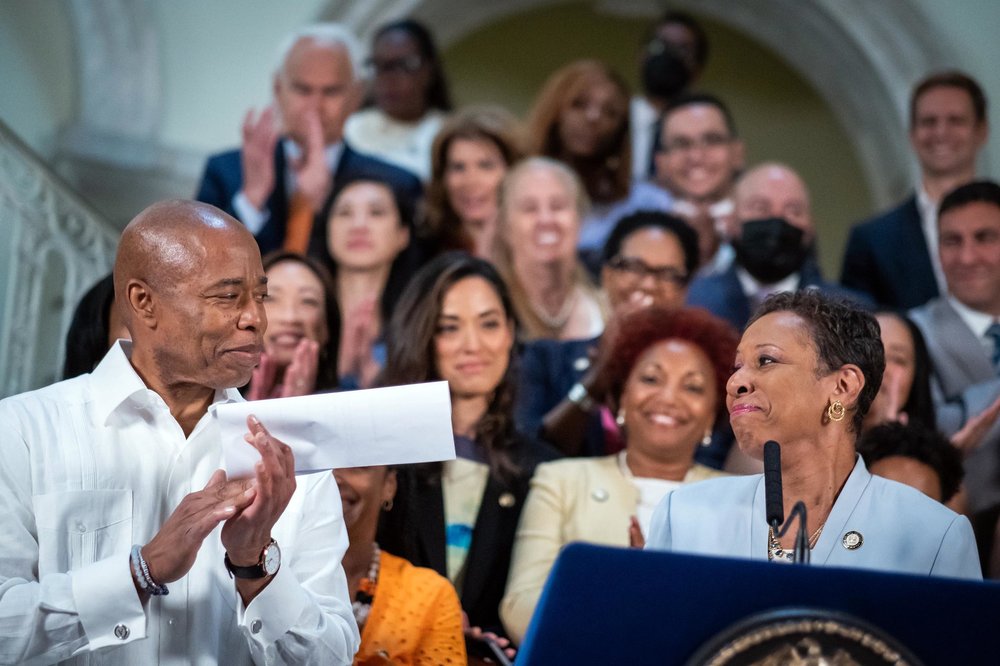NYC Council to form its own commission amid ongoing battle over Mayor Adams' authority to govern
Oct. 16, 2024, 3:17 p.m.
The Council tried to wrest unilateral authority from the mayor’s office over 21 administration appointments, setting off a monthslong battle over mayoral power.

New York City Council Speaker Adrienne Adams is opening a new front in the battle between an increasingly diminished mayor and an emboldened city legislature — setting up the potential to change the balance of power in City Hall.
The speaker plans to introduce a bill that would allow the City Council to initiate its own commission tasked with proposing changes to the City Charter, which is essentially the city’s constitution, according to three Council officials who requested anonymity to discuss closed-door talks during the Democratic conference.
While it's still unclear what the commission would prioritize beyond seeking to improve transparency and good governance, the Council has been pushing for a larger say over mayoral appointments, similar to U.S. Senate confirmations of high-level federal officials and existing practices in large cities like Chicago.
The bill could be introduced as soon as next Wednesday, two of the officials said, and the commission would be tasked with developing ballot proposals that would go before voters in 2025 or the following year.
“Even before the chaos at City Hall we were already having these discussions,” said one councilmember who attended the Tuesday meeting. Early in his administration, Mayor Adams faced criticism over some of his appointees’ past statements and positions.
“Now it’s injected some rocket fuel into those discussions around transparency, around good government … around trying to restore confidence in a city government that people might not be high on right now,” the official continued.
The new bill would give the speaker, the public advocate, the comptroller and the mayor a specified number of appointments to the commission, along with all of the borough presidents, according to three people who were in the meeting. How many appointments each official would get is still under discussion.
The anticipated move comes as Mayor Adams, who is staring down a federal indictment on bribery and fraud charges, attempts to convince the public that his administration continues to function as it is beset by scandal.
In a statement on Wednesday, the mayor's spokesperson Liz Garcia said he would “review the bill if and when it is introduced.”
"Through the Charter Revision Commission, a procedure codified in the city's laws, we gave working-class New Yorkers from all walks of life the opportunity to share their vision for a safer, more affordable city,” Garcia said in a statement. “We are excited for millions of New Yorkers to flip their ballots and weigh in on these proposals this November."
The speaker told attendees on Tuesday that she wanted the Council’s commission to be a model for future panels tasked with amending the city charter, in order to “re-establish important standards and public trust” — unlike what she described as a rushed process under the mayor’s commission, according to one person in the meeting.
That saga began in May, when the New York Times requested comment from the mayor’s office on the speaker’s intention to introduce a draft bill that would enable the Council to give its “advice and consent” over a slate of mayoral appointments, with voters having the final say over the measure on the upcoming November ballot.
Hours later, the mayor announced that he would form a charter revision commission tasked with proposing its own ballot measures — which, procedurally, take precedence over any measures put forward by the Council. The mayor’s commission adopted its proposals in July, which voters will now see on this year’s ballot instead.
“It isn’t supposed to be something that happens in a quarter of a year,” said another councilmember who attended the meeting. “It’s something that is supposed to be more extensive.”
The Council last formed its own charter revision commission in 2018, which paved the way for the advice and consent referendum for the city’s chief corporation counsel that was approved by voters a year later.
This year, Randy Mastro withdrew himself from consideration for the post after a contentious nomination hearing and months of opposition from councilmembers who took issue with the nominee’s previous legal clientele — including the state of New Jersey, which Mastro represented in its lawsuit to block congestion pricing.
More Council approval over senior administration posts would represent a significant diminution of the mayor’s power — one of the likely reasons Adams fought the measure with his charter commission. The mayor’s office and commission leadership have denied that it was a response to the Council, and the mayor himself has repeatedly bristled at the notion that the process was rushed.
“We are not here, we were not asked to be on this to thwart anything,” Commission Chair Carlo Scissura said in July. “We were not spoken to about any bills that may be out there. It has not come up.”
Forty elected officials have publicly banded together to urge voters to reject the commission’s proposals this November, calling them a “power grab.”
“If he wanted to, he could just keep putting forward these kangaroo court charter revision commissions,” one councilmember who attended the meeting said. “But at some point he’ll just look ridiculous.”
NY politicians warn voters city ballot questions are a Mayor Adams power grab NYC ballot measure would expand trash pickup — and street vendor crackdowns Mayor Adams’ Charter Revision Commission dropped its first plan. But what does it do?